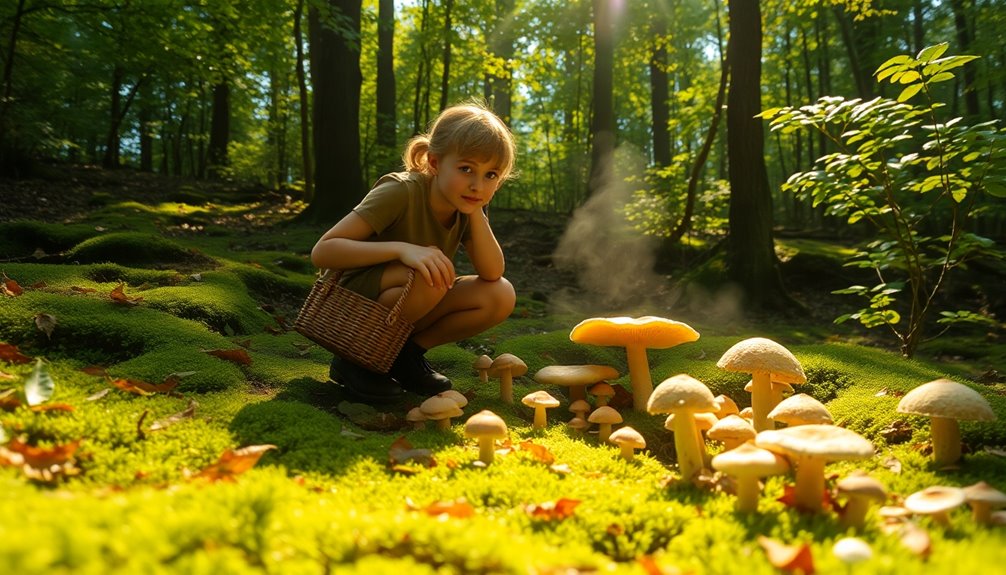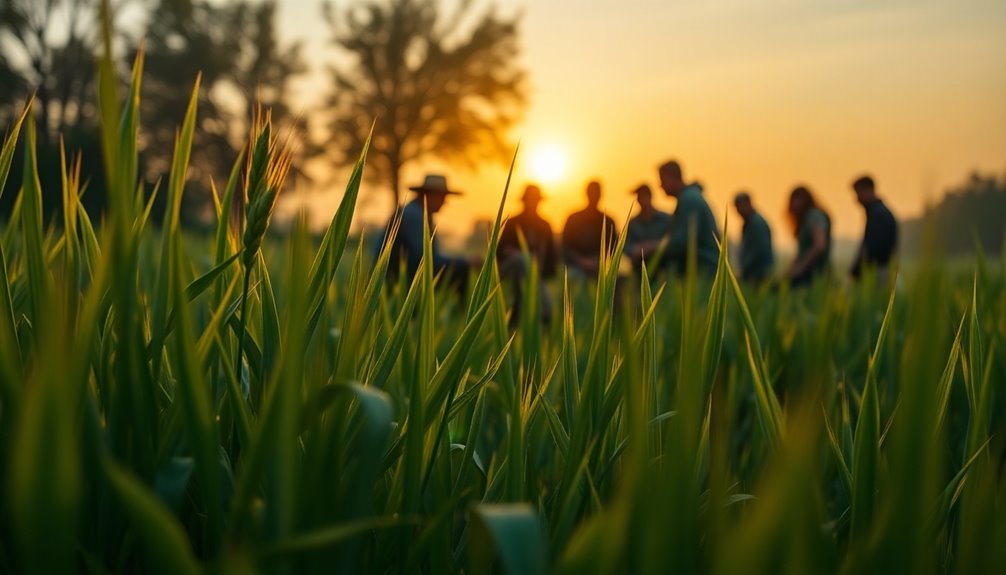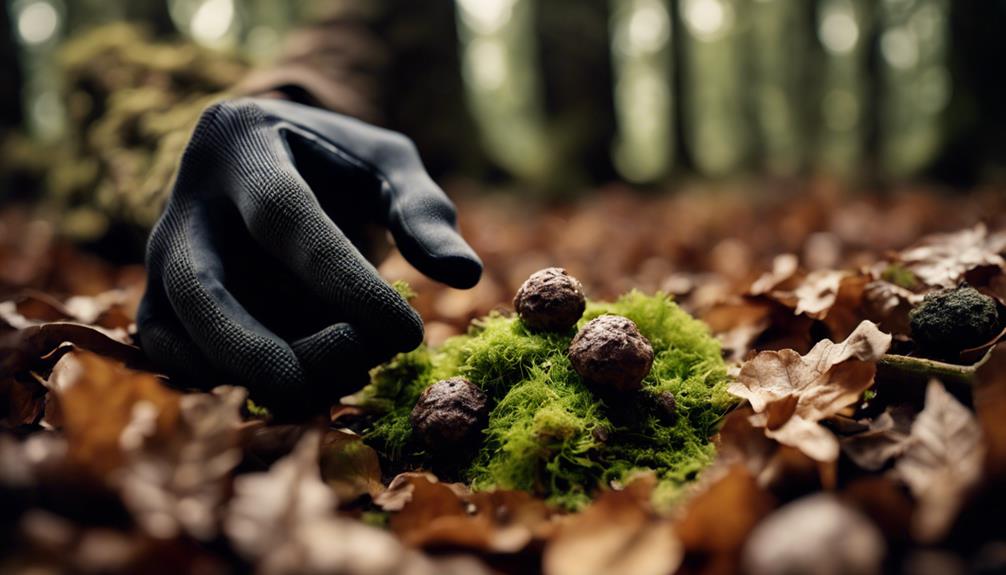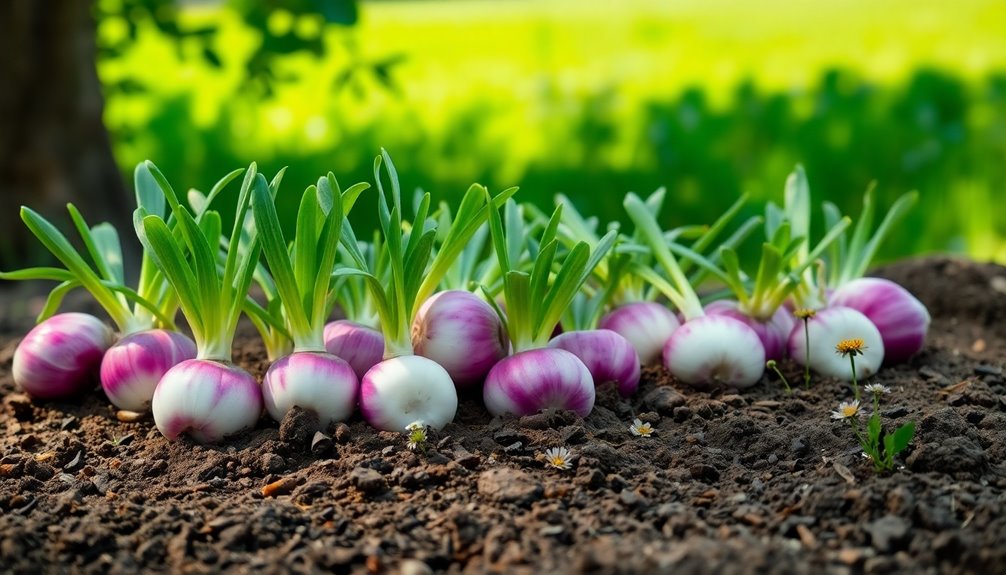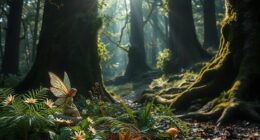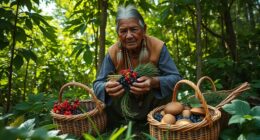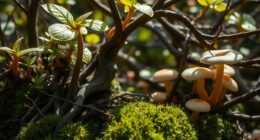Mushroom foraging offers a unique adventure that can truly change your life. Imagine wandering through lush forests, discovering the hidden culinary gems of nature. You'll get a workout while embracing mindfulness and building connections with fellow foragers. Plus, you'll reveal the world of nutrition by adding delicious varieties to your meals. But remember, safety's key—use field guides and consult experts to avoid toxic varieties. Equipped with a basket and a sharp knife, you'll be ready for this enriching experience. As you explore the nuances of foraging, you'll uncover much more about the fascinating world of mushrooms.
Key Takeaways
- Engaging in mushroom foraging promotes physical fitness through exploration of diverse natural habitats while enjoying the great outdoors.
- Foraging provides access to nutritious, free food options like chanterelles and porcini, enhancing your diet with unique flavors and health benefits.
- The practice fosters mindfulness, allowing individuals to connect deeply with nature and appreciate their surroundings during each foraging adventure.
- Building a community of fellow foragers enhances social experiences, boosts confidence in mushroom identification, and encourages shared knowledge.
- Understanding the ecological contributions of mycelium fosters appreciation for nature, highlighting the interconnectedness of ecosystems and the importance of sustainable foraging practices.
Benefits of Mushroom Foraging
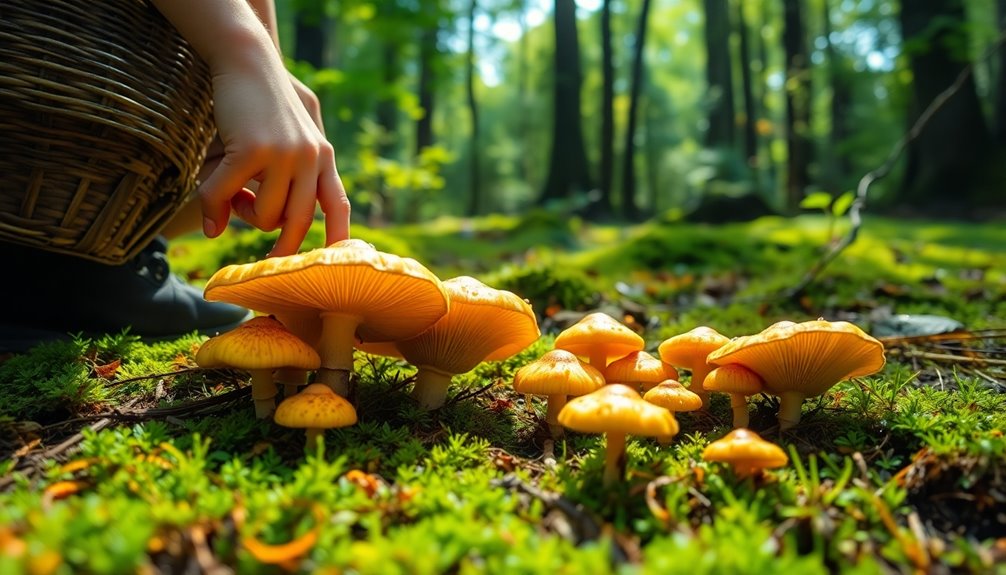
Mushroom foraging offers you an exciting way to connect with nature while reaping numerous benefits. As you venture into the beautiful landscapes of the Pacific Northwest, mushroom hunting becomes a thrilling outdoor adventure that promotes physical health.
Walking through diverse habitats and exploring the forest floor not only keeps you active but also engages your mind as you learn to identify various species.
In addition to the exercise, foraging provides access to free, nutritious food. Popular edible varieties like king oyster, chanterelles, and morels can enhance your culinary experiences while offering significant health benefits.
The act of foraging fosters mindfulness, allowing you to appreciate the natural world around you while building a deeper connection to your environment.
Participating in mushroom foraging also encourages community connections. You'll share knowledge and experiences with fellow enthusiasts, enriching your journey and creating lasting friendships.
Plus, understanding the ecological roles of mushrooms and mycelium highlights their importance in nutrient cycling and habitat preservation, further enhancing your appreciation for nature. In many regions, foraging can also introduce you to a variety of local edible species that contribute to the rich biodiversity found in natural ecosystems.
With all these benefits, mushroom foraging becomes more than just a hobby; it's a way to improve your well-being and foster a love for the great outdoors.
Essential Safety Guidelines
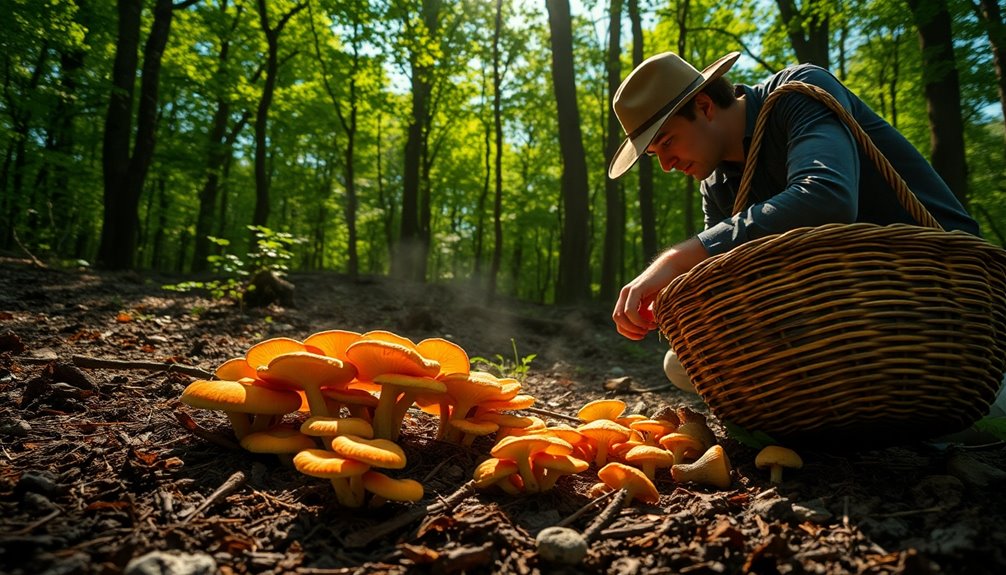
Foragers must prioritize safety when venturing into the woods for mushrooms. The thrill of discovering wild fungi can quickly turn dangerous if you're not careful. To guarantee a safe experience on the west coast or anywhere else, consider these essential guidelines:
| Guideline | Description | Importance |
|---|---|---|
| Use a Field Guide | Always carry a reliable field guide or identification app like iNaturalist. | Helps avoid toxic species. |
| Forage with an Expert | Go with someone experienced to gain practical knowledge. | Reduces risks associated with foraging. |
| Know Local Regulations | Familiarize yourself with foraging laws in your area. | Guarantees compliance and safety. |
| Carry a First Aid Kit | Maintain awareness of your surroundings and pack a first aid kit. | Addresses minor injuries quickly. |
Next time you're out enjoying your love for mushrooms, remember to observe their habitats and growth conditions. This knowledge enhances your identification skills and keeps you safe. Additionally, understanding local regulations can help ensure you're foraging responsibly. Embrace the adventure, but never compromise your safety!
Community of Mycophiles

A vibrant community of mycophiles thrives among those passionate about mushrooms and foraging. As you explore this fascinating world, you'll find countless enthusiasts keen to share their knowledge and experiences. These connections foster a supportive environment that emphasizes safe and informed foraging practices.
Local foraging groups often gather on social media platforms, making it easy for you to join discussions, share your findings, and participate in exciting events like foraging trips and educational workshops. Many mycophiles also engage in citizen science, documenting their mushroom sightings on platforms such as iNaturalist, which helps enhance our understanding of fungal biodiversity.
Additionally, mushroom festivals are popular community events organized by mycophiles, where you can learn about mushroom identification, culinary uses, and sustainable foraging practices.
The camaraderie among mycophiles enriches your foraging journey, as you exchange tips, recipes, and safety precautions. This shared knowledge not only boosts your confidence but also deepens your connection to nature and the vibrant culture of mushroom hunting.
Embrace the community of mycophiles, and you'll discover an adventure that's both educational and unforgettable.
Tools and Equipment Needed
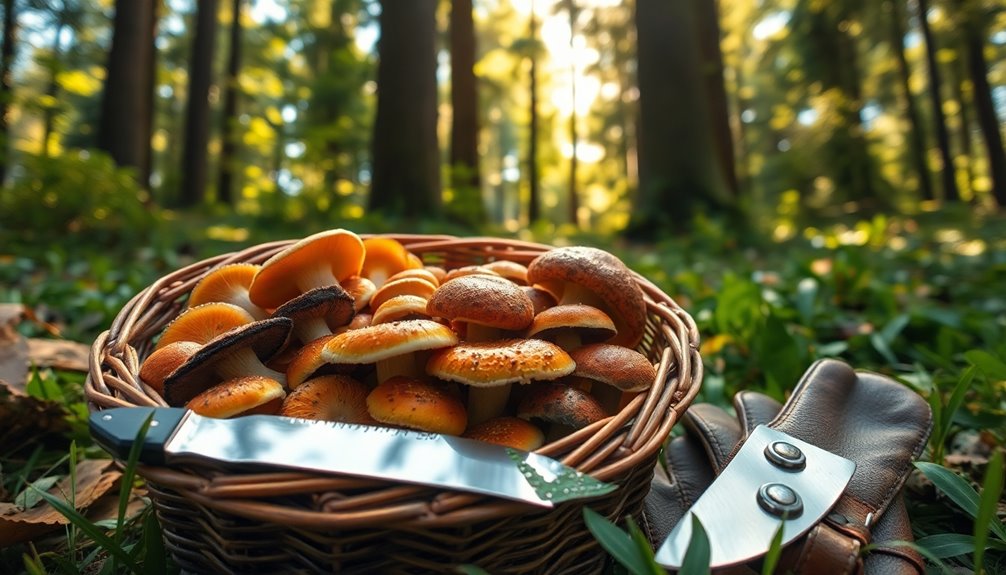
Engaging with the mycophile community naturally leads you to contemplate the right tools and equipment for a successful foraging adventure.
First and foremost, you'll need a sturdy basket to collect your finds. This is much better than a plastic bag, which can crush delicate mushrooms. A sharp knife is essential for cutting mushrooms cleanly from their mycelium, minimizing damage. Don't forget gloves to protect your hands while handling potentially spiky or dirty specimens.
A reliable field guide or a mushroom identification app like iNaturalist is vital for distinguishing between edible and toxic varieties. You wouldn't want to risk your health by misidentifying a mushroom.
Bringing along a notebook can also be beneficial; jot down observations, locations of your finds, and notes on the habitats where mushrooms thrive. This information will enhance your future foraging experiences.
Lastly, consider packing binoculars to spot mushrooms from a distance, especially in dense forest areas. Additionally, knowing the importance of basket size and shape for foraging can further optimize your collection process.
And to be prepared for any minor injuries while traversing through the woods, a first aid kit is a smart addition to your gear.
With the right tools, you'll be set for an exciting mushroom foraging journey!
Understanding Mycelium's Role
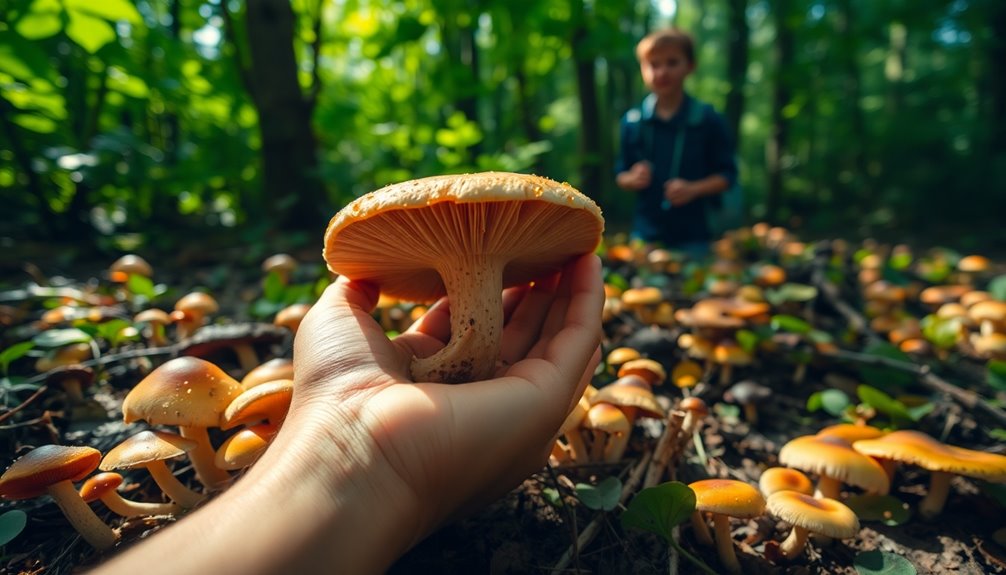
When you explore the world of mushrooms, you can't overlook mycelium's crucial role in the ecosystem.
This underground network acts as a nutrient exchange hub, connecting trees and plants to promote ecological balance.
Nutrient Exchange Network
Beneath the forest floor lies a remarkable network of mycelium, the root-like structure of fungi, that plays an indispensable role in nutrient exchange among plants and trees.
This intricate system spans several acres, connecting multiple plant species and allowing them to share crucial resources. Understanding how mycelium functions can change your perspective on nature and foraging.
Here are four key aspects of mycelium's nutrient exchange network:
- Nutrient Sharing: Mycelium facilitates the transfer of nutrients like nitrogen and phosphorus between plants, enhancing growth and resilience.
- Soil Health: It breaks down organic matter, recycling nutrients back into the soil, which is critical for maintaining a healthy ecosystem.
- Water Retention: Mycelium improves soil structure, allowing it to retain water better, which is essential for plant survival, especially during dry spells.
- Biodiversity Support: Healthy mycelium networks supply nutrients to various plants and serve as a food source for numerous organisms, promoting overall biodiversity.
Ecological Balance Contribution
Mycelium's intricate underground networks do more than just facilitate nutrient exchange; they play a significant role in maintaining ecological balance. By decomposing organic matter, mycelium recycles nutrients, enhances soil fertility, and supports plant growth and biodiversity. This network serves as a lifeline for various species, connecting them and enabling better adaptation to environmental changes.
Furthermore, mycelium contributes to carbon sequestration, storing carbon in the soil and helping mitigate climate change. The symbiotic relationships formed through mycorrhizae improve water absorption and nutrient uptake, benefiting both fungi and plants alike.
Here's a closer look at mycelium's contributions to ecological balance:
| Contribution | Description |
|---|---|
| Nutrient Recycling | Decomposes organic matter, returning nutrients to the soil. |
| Soil Fertility | Enhances soil structure, promoting healthier plant growth. |
| Carbon Sequestration | Stores carbon in the soil, aiding in climate change mitigation. |
| Ecosystem Resilience | Connects species, improving adaptability to environmental changes. |
| Symbiotic Relationships | Forms partnerships with plants for improved water and nutrient uptake. |
Understanding mycelium's role can inspire you to appreciate the delicate balance of our ecosystems.
Culinary Adventures With Mushrooms
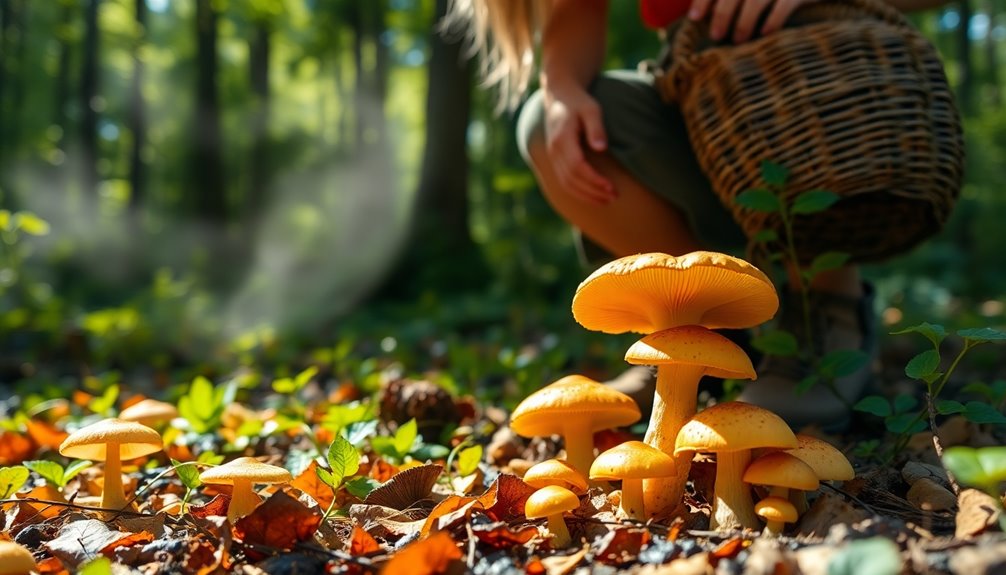
Exploring the culinary world of mushrooms opens up a treasure trove of flavors and textures that can transform your cooking.
With varieties like chanterelles, porcini, and morels, you'll discover unique tastes that enhance your dishes while providing nutritional benefits such as vitamins D and B, fiber, and antioxidants.
Here are four ways to incorporate mushrooms into your meals:
- Elevate Pasta and Risotto: Sauté shiitake or king oyster mushrooms to add umami richness and depth to your favorite recipes.
- Boost Cognitive Health: Try lion's mane mushrooms in soups or stir-fries to potentially enhance your brain function while enjoying a delicious meal.
- Explore Meat Alternatives: Embrace the growing trend of fungi-based products, like mushroom burgers, for a sustainable and eco-friendly dining experience.
- Grow Your Own: Use mushroom grow kits at home to cultivate fresh ingredients, expanding your culinary repertoire with ease.
Identifying Edible vs. Toxic Varieties
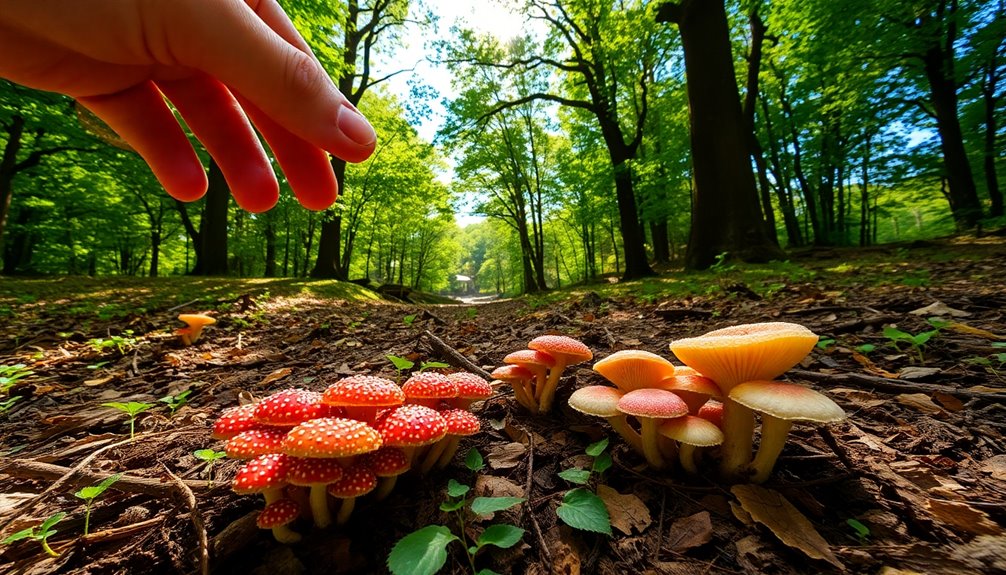
How can you safely enjoy the thrill of mushroom foraging without risking your health? The key lies in proper identification. Many mushrooms, especially the highly toxic Amanita species, can easily be confused with edible varieties, leading to severe health risks.
Start by familiarizing yourself with local species using field guides or apps like iNaturalist, which provide pictures and detailed descriptions to help you identify them accurately.
Pay attention to key identifying features such as cap shape, color, gills, and habitat. For instance, chanterelles have a distinctive wavy edge and tend to grow in clusters on the forest floor.
Always consult multiple sources to confirm your findings. If you can, forage with an experienced individual who can help reduce the risk of misidentification and potential poisoning.
Remember that some edible mushrooms have toxic look-alikes. If you're ever unsure about a mushroom's edibility, it's safest to err on the side of caution and not consume it. Your health is far more important than a risky bite.
The Foraging Experience
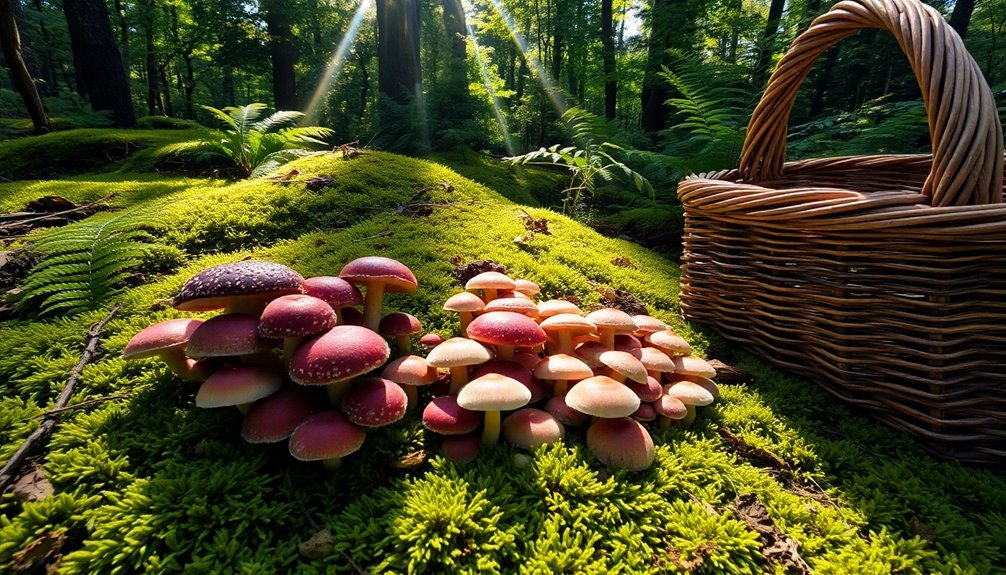
When you head out into the woods for mushroom foraging, you're not just searching for fungi; you're forging a deeper connection with nature.
The thrill of discovery keeps you engaged, as each find feels like uncovering a hidden treasure.
Plus, sharing your experiences with fellow foragers fosters community and enriches the adventure even more.
Connection With Nature
Have you ever wandered through a forest and felt an inexplicable connection to the earth beneath your feet? Mushroom foraging offers you that unique opportunity to immerse yourself in nature like never before.
As you navigate the forest floor, you'll gain a deeper appreciation for the biodiversity surrounding you, enriching your understanding of the ecosystems that nurture fungi. Additionally, understanding tree relationships is crucial for successful foraging. Engaging in foraging also promotes natural remedies, which can enhance your overall health and well-being.
Here are four ways foraging enhances your connection with nature:
- Mindfulness: Focusing on your surroundings sharpens your awareness of the intricate details of mushroom habitats.
- Adventure: Each foraging trip is a new exploration, revealing hidden treasures that encourage physical activity and outdoor engagement.
- Tranquility: Many foragers report feelings of joy and calm during their time spent among the trees, showcasing the mental health benefits of being outdoors. Engaging with nature through foraging can significantly enhance your overall well-being.
- Community: Connecting with fellow mycophiles fosters social bonds, cultivating a collective appreciation for the environment and its resources. Additionally, understanding the impact of foraging practices on biodiversity can deepen your commitment to sustainable harvesting.
Thrill of Discovery
Stepping into the forest with a basket in hand ignites a sense of adventure that's hard to match. As you wander among the trees, your heart races at the prospect of uncovering hidden treasures like morels and chanterelles, often tucked beneath leaves and debris. Each step feels like a treasure hunt, and when you finally spot a prized mushroom, an exhilarating rush floods over you.
The thrill of discovery doesn't just lie in finding these edible gems; it's also about connecting with the environment. You start noticing subtle signs in nature that guide you to specific mushrooms, sharpening your observation skills. This immersive experience fosters mindfulness, letting you fully engage with the sights, sounds, and smells of the forest.
As you forage, there's a unique joy in sharing these moments with fellow foragers. The excitement of uncovering nature's hidden gems together not only enhances your adventure but also strengthens bonds through shared knowledge and experiences.
Mushroom foraging becomes more than just a hobby; it transforms into a thrilling journey of discovery that deepens your appreciation for the natural world.
Community Engagement
How can engaging with a community of fellow foragers elevate your mushroom foraging experience? When you connect with other enthusiasts, you tap into a wealth of knowledge that can transform your foraging journey.
Here's how community engagement can enhance your adventure:
- Knowledge Sharing: Mycophiles often share valuable insights on mushroom identification, boosting your confidence and expertise.
- Educational Opportunities: Attend mushroom festivals to learn about different species, cooking techniques, and sustainable foraging practices.
- Mentorship: Join foraging groups to connect with experienced individuals who can guide you in safe identification and foraging techniques, minimizing risks.
- Collaborative Learning: Share your foraging successes and challenges, enriching your experience while building a supportive network of fellow enthusiasts.
Participating in local foraging communities not only fosters camaraderie but also opens doors to group forays, where you can explore new habitats together.
You'll appreciate the often hidden beauty of mushrooms in nature, enhancing your connection to the environment. Engaging with others makes the foraging experience more rewarding, turning a solitary hunt into a shared adventure filled with learning and discovery.
Ecological Importance of Mushrooms
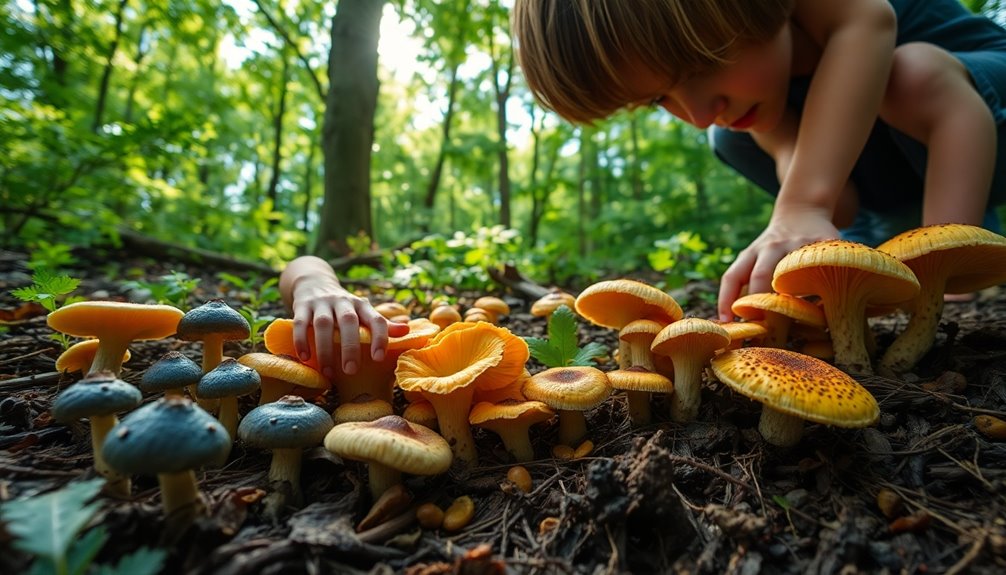
Mushrooms are fundamental players in our ecosystems, fulfilling multiple roles that enhance environmental health. They break down organic matter, returning essential nutrients to the soil and promoting plant growth.
When you explore the woods, you might notice mycelium, the fungi's vegetative part, forming symbiotic relationships with tree roots through mycorrhizae. This partnership facilitates the exchange of nutrients and enhances forest health, creating a thriving environment.
Additionally, fungi, including mushrooms, are important for decomposing dead organic matter. This process maintains ecological balance and supports diverse ecosystems.
As you forage, keep an eye out for certain mushroom species, as they serve as key indicators of environmental health. Their presence or absence can reveal changes in soil quality and ecosystem stability.
Moreover, mushrooms support wildlife by acting as a food source for various animals, contributing to the overall biodiversity of their habitats.
By understanding the ecological importance of mushrooms, you develop a deeper appreciation for the natural world and its interconnectedness.
Frequently Asked Questions
What Is the Saying About Mushroom Forager?
The saying about mushroom foragers goes, "There are old mushroom foragers and bold mushroom foragers, but there are no old bold mushroom foragers."
This highlights the importance of caution and knowledge in foraging. While it's great to be enthusiastic, you need to balance that with safety and proper identification.
Always remember, successful foraging relies on experience and a careful approach. Stay curious, but don't forget to respect the potential dangers in the wild.
Is Mushroom Foraging Illegal?
Mushroom foraging isn't illegal everywhere, but it can feel like maneuvering through a legal maze!
In some areas, you'll find it's perfectly fine, while in others, strict regulations or permits may apply.
Always check local laws before you head out, especially in national parks or private land.
It's crucial to respect these rules not just to avoid trouble, but to help protect those mysterious fungi habitats you're so enthusiastic to explore.
What Are the Benefits of Mushroom Foraging?
Mushroom foraging offers numerous benefits.
You'll connect with nature, enjoying the physical activity and fresh air as you explore. It sharpens your observational skills while enhancing mindfulness, allowing you to appreciate your surroundings.
Plus, you can discover delicious, nutritious edible mushrooms like chanterelles and porcini.
Engaging with local foraging communities enriches your knowledge and fosters friendships, deepening your understanding of mushrooms and their essential roles in our ecosystems.
What Is the Best Beginner Mushroom Foraging?
The best beginner mushrooms for foraging include chanterelles, morels, and king oysters.
These mushrooms have distinct characteristics that make them easy to identify, reducing the risk of confusion with toxic varieties.
To enhance your foraging experience, invest in a quality field guide or use identification apps like iNaturalist.
Joining local foraging groups can also boost your confidence and knowledge, allowing you to safely enjoy this rewarding outdoor activity.
Always prioritize safety!
Conclusion
Mushroom foraging isn't just a hobby; it could transform your life! Did you know that over 10,000 species of mushrooms exist in North America alone? Exploring these diverse fungi connects you to nature, sparks your culinary creativity, and builds community with fellow mycophiles. By following essential safety guidelines and respecting the ecological importance of mushrooms, you'll set out on an exciting adventure that enriches your life in unexpected ways. So grab your basket and plunge into this mysterious world!

